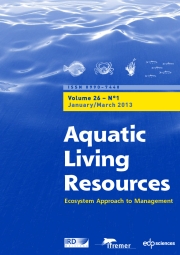Crossref Citations
This article has been cited by the following publications. This list is generated based on data provided by
Crossref.
Rinkevich, Baruch
Paz, Guy
Douek, Jacob
and
Ben-Shlomo, Rachel
2001.
The Biology of Ascidians.
p.
426.
Kamer, I
and
Rinkevich, B
2002.
In vitro application of the comet assay for aquatic genotoxicity: considering a primary culture versus a cell line.
Toxicology in Vitro,
Vol. 16,
Issue. 2,
p.
177.
Voskoboynik, Ayelet
Reznick, Abraham Z.
and
Rinkevich, Baruch
2002.
Rejuvenescence and extension of an urochordate life span following a single, acute administration of an anti-oxidant, butylated hydroxytoluene.
Mechanisms of Ageing and Development,
Vol. 123,
Issue. 9,
p.
1203.
Voskoboynik, Ayelet
Rinkevich, Baruch
Weiss, Anna
Moiseeva, Elizabeth
and
Reznick, Abraham Z.
2004.
Macrophage involvement for successful degeneration of apoptotic organs in the colonial urochordateBotryllus schlosseri.
Journal of Experimental Biology,
Vol. 207,
Issue. 14,
p.
2409.
Rabinowitz, Claudette
and
Rinkevich, Baruch
2004.
In vitrodelayed senescence of extirpated buds from zooids of the colonial tunicateBotryllus schlosseri.
Journal of Experimental Biology,
Vol. 207,
Issue. 9,
p.
1523.
Rinkevich, Baruch
and
Yankelevich, Irena
2004.
Environmental split between germ cell parasitism and somatic cell synergism in chimeras of a colonial urochordate.
Journal of Experimental Biology,
Vol. 207,
Issue. 20,
p.
3531.
Simon-Blecher, Noa
Achituv, Yair
and
Rinkevich, Baruch
2004.
Protochordate concordant xenotransplantation settings reveal outbreaks of donor cells and divergent life span traits.
Developmental & Comparative Immunology,
Vol. 28,
Issue. 10,
p.
983.
Lapidot, Ziva
and
Rinkevich, Baruch
2005.
Development of Panel of Monoclonal Antibodies Specific to Urochordate Cell Surface Antigens.
Marine Biotechnology,
Vol. 7,
Issue. 5,
p.
532.
Lapidot, Z.
and
Rinkevich, B.
2006.
Development of monoclonal antibodies specific to urochordate intracellular epitopes.
Cell Biology International,
Vol. 30,
Issue. 2,
p.
190.
Rosner, Amalia
Paz, Guy
and
Rinkevich, Baruch
2006.
Divergent roles of the DEAD-box protein BS-PL10, the urochordate homologue of human DDX3 and DDX3Y proteins, in colony astogeny and ontogeny.
Developmental Dynamics,
Vol. 235,
Issue. 6,
p.
1508.
Rosner, Amalia
Rabinowitz, Claudette
Moiseeva, Elizabeth
Voskoboynik, Ayelet
and
Rinkevich, Baruch
2007.
BS-Cadherin in the colonial urochordate Botryllus schlosseri: One protein, many functions.
Developmental Biology,
Vol. 304,
Issue. 2,
p.
687.
Rinkevich, Yuval
Douek, Jacob
Haber, Omer
Rinkevich, Baruch
and
Reshef, Ram
2007.
Urochordate whole body regeneration inaugurates a diverse innate immune signaling profile.
Developmental Biology,
Vol. 312,
Issue. 1,
p.
131.
Oren, Matan
Escande, Marie-line
Paz, Guy
Fishelson, Zvi
Rinkevich, Baruch
and
Zimmer, Jacques
2008.
Urochordate Histoincompatible Interactions Activate Vertebrate-Like Coagulation System Components.
PLoS ONE,
Vol. 3,
Issue. 9,
p.
e3123.
Rinkevich, Yuval
Rinkevich, Baruch
and
Reshef, Ram
2008.
Cell signaling and transcription factor genes expressed during whole body regeneration in a colonial chordate.
BMC Developmental Biology,
Vol. 8,
Issue. 1,
Rosner, Amalia
Moiseeva, Elizabeth
Rinkevich, Yuval
Lapidot, Ziva
and
Rinkevich, Baruch
2009.
Vasa and the germ line lineage in a colonial urochordate.
Developmental Biology,
Vol. 331,
Issue. 2,
p.
113.
Rabinowitz, Claudette
Alfassi, Gilad
and
Rinkevich, Baruch
2009.
Further portrayal of epithelial monolayers emergent de novo from extirpated ascidians palleal buds.
In Vitro Cellular & Developmental Biology - Animal,
Vol. 45,
Issue. 7,
p.
334.
Oren, Matan
Paz, Guy
Douek, Jacob
Rosner, Amalia
Fishelson, Zvi
Goulet, Tamar L.
Henckel, Kolja
and
Rinkevich, Baruch
2010.
‘Rejected’ vs. ‘rejecting’ transcriptomes in allogeneic challenged colonial urochordates.
Molecular Immunology,
Vol. 47,
Issue. 11-12,
p.
2083.
Rinkevich, Yuval
Rosner, Amalia
Rabinowitz, Claudette
Lapidot, Ziva
Moiseeva, Elithabeth
and
Rinkevich, Buki
2010.
Piwi positive cells that line the vasculature epithelium, underlie whole body regeneration in a basal chordate.
Developmental Biology,
Vol. 345,
Issue. 1,
p.
94.
Rabinowitz, Claudette
and
Rinkevich, Baruch
2011.
De novo emerged stemness signatures in epithelial monolayers developed from extirpated palleal buds.
In Vitro Cellular & Developmental Biology - Animal,
Vol. 47,
Issue. 1,
p.
26.
Rosner, Amalia
Moiseeva, Elizabeth
Rabinowitz, Claudette
and
Rinkevich, Baruch
2013.
Germ lineage properties in the urochordate Botryllus schlosseri – From markers to temporal niches.
Developmental Biology,
Vol. 384,
Issue. 2,
p.
356.


